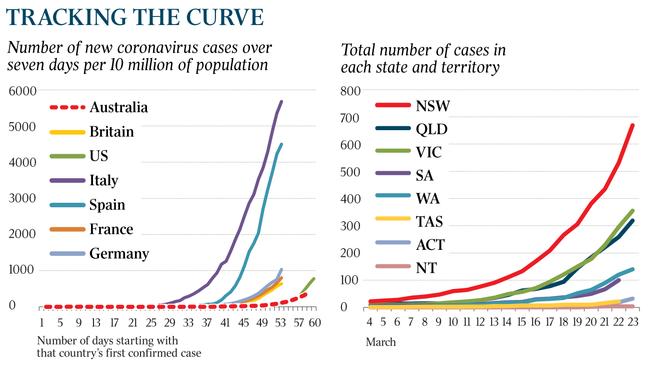Coronavirus: ‘Appropriate’ curbs could slow rate within a month
Australian medical experts say the rate of new coronavirus infections should begin to slow within a month.
Australian medical experts say the rate of new coronavirus infections should begin to slow within a month after the federal and state governments ordered the closure of clubs, pubs, gyms and cinemas.
The stage one restrictions introduced from midday on Monday were endorsed as “entirely appropriate” and “proportionate” to the rapidly increasing number of coronavirus cases across the country.
Indoor sporting and entertainment venues, casinos and nightclubs were closed, while restaurants and cafes can only do takeaway or home delivery.
“My current belief is we will see increasing numbers over the next few weeks, mainly because of return (overseas traveller) numbers,” Australian National University medical school professor Peter Collignon said.
“Up to 12 days (from exposure) is when people usually get it. We should start seeing decreasing numbers of new cases in three or four weeks, providing there are not huge numbers of people who have visited overseas coming in.”
According to data compiled by The Australian, Australia’s rate of new cases over seven days per capita is increasing at a slower rate than other Western countries but it is accelerating.
The rate in the US is almost double Australia’s.
Professor Collignon, an infectious diseases physician and microbiologist, said the “responsible” stage one shutdown measures “should help flatten the curve … The vast majority of new cases to come in are from areas where there is a lot of community spread, including the US and Europe. We don’t appear to have that.

“Tightening up everything we can to decrease the risk of infection going person-to-person is a good idea within the limits of not paralysing society. We can’t all become hermits for the next six months. There are essential functions, including food delivery, shops, keeping that open.”
William Rawlinson, a University of NSW professor in medicine and science, said a staged approach to prevent the spread of coronavirus was important because “you’ve got to take people along with you”.
He was hopeful the stage one shutdown, which he labelled a “major intervention”, would have an effect within two to four weeks. “It’s dependent upon a lot of things including the weather, if people are crowding together because it’s getting colder (that wouldn’t help). Testing, if we continue to test at high rates then we identify and quarantine,” he said.
“At a guess, you’d see three to six months being the increase and decrease in this with the peak sometime around June.”




To join the conversation, please log in. Don't have an account? Register
Join the conversation, you are commenting as Logout